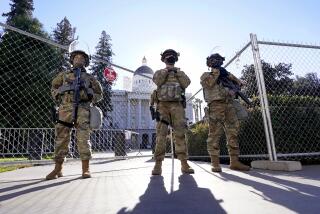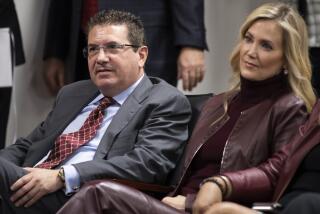Pentagon Report Faults Officers in McDonnell Case
- Share via
The Pentagon inspector general has called for disciplinary action against two Air Force generals and the service’s former procurement chief for allegedly bailing out McDonnell Douglas in 1990 by secretly advancing payments of nearly $500 million to the financially troubled company.
A 100-page investigative report alleges that senior Air Force officials devised a sophisticated plan to save the nation’s largest defense firm--charges that are likely to lead to a criminal investigation, according to a Pentagon official.
Air Force Secretary Donald Rice said Sunday that he is initiating an independent review to “provide a factual basis” to act on the report’s recommendations. Rice leaves office Wednesday with the rest of the Bush Administration, but he is expected to appoint an investigatory panel before then.
McDonnell spokesman Pete Sloan said the firm had not seen the report and could not comment on it, but that “from what we have heard, it only raises old issues.” In the past, the company has denied that a bailout occurred.
In the closing months of 1990, the service undertook a broad range of efforts to funnel money to McDonnell’s troubled C-17 cargo jet program by shifting contracting funds, accepting incomplete aircraft and taking other technical contracting actions, according to sources familiar with the report.
The report concludes that Air Force officials created an elaborate cover-up of the bailout, including relaying false information and overly optimistic reports about the progress of the C-17 program. Air Force officials funneled payments to McDonnell that circumvented Pentagon procurement regulations, it found.
The inspector general’s report recommends disciplinary action against, among others, Lt. Gen. Edward P. Barry Jr., a former program executive officer for the C-17 and now commander of the Air Force Space Division in Los Angeles. It also named Maj. Gen. Michael Butchko, a former C-17 program manager, and John Welch Jr., a former assistant secretary of the Air Force.
The report will not be publicly released until McDonnell reviews it for any potential proprietary information, but details of the report became known Sunday. Rice acknowledged in his statement that it called for disciplinary action against “several individuals.” An Air Force spokesman said he could not go beyond Rice’s statement.
The C-17 program has been among the Air Force’s most controversial projects. McDonnell has overrun its C-17 contracts by more than $1 billion, saddling the firm with heavy losses. The firm has been dogged by criticism of its management and concern that the jet will not meet its specifications.
The report on the bailout comes as the company is preparing to submit a $1-billion claim to the Air Force, asserting that the government caused the overruns by disrupting work.
McDonnell’s Sloan said the company’s “position has been and continues to be that McDonnell performed the work under the contract, submitted the bills for the work under the Department of Defense accounting rules then in effect, and we were paid only for work performed.”
The company said it “would not be appropriate” to comment on whether Air Force officials may have violated their own rules in the way they handled the company’s payment requests.
The allegations raise serious questions about the Air Force’s and Bush Administration’s alleged effort to keep the nation’s largest defense contractor afloat.
Rep. John Conyers Jr. (D-Mich.), who requested the report as chairman of the Government Operations Committee, said Sunday that he “intends to pursue any allegations of wrongdoing to the fullest extent of the authority of the Congress.” Conyers declined to discuss the contents of the report.
Allegations about special assistance to McDonnell surfaced in early 1992, when the inspector general charged that the Air Force had a bailout plan and that it made several questionable payments. The new report--issued after eight months of investigation--goes much further, asserting that the bailout amounted to more than twice the $220 million previously questioned.
In some cases, the Air Force advanced money to McDonnell for work not yet performed, but in other cases it provided funds that should never have been paid, according to a defense source.
In the past, Butchko has denied that any bailout occurred. At a House Government Operations Committee hearing, Butchko testified that he could not recall attending a key meeting in October, 1990, where a bailout plan was discussed.
But a few months later, Butchko submitted his notes from the meeting, indicating that the company needed $548 million to stay afloat. The notes showed that $300 million to $350 million was available and he wrote “200-250 short.”
Air Force officials exerted significant pressure on local defense officials at the Douglas Aircraft plant in Long Beach to keep payments flowing, according to testimony last May by Col. Kenneth Tollefson, who was the plant representative at Douglas.
Tollefson was one of the few officials cited by the inspector general who tried to resist the special assistance to McDonnell.
At the October, 1990, meeting McDonnell Chairman John McDonnell threatened to stop C-17 production if he was not provided with about $500 million of relief, according to participants in the meeting.
The company has denied that any threat was made, but acknowledged that the company discussed the consequences to the C-17 program because of its cash shortage.
More to Read
Sign up for Essential California
The most important California stories and recommendations in your inbox every morning.
You may occasionally receive promotional content from the Los Angeles Times.











